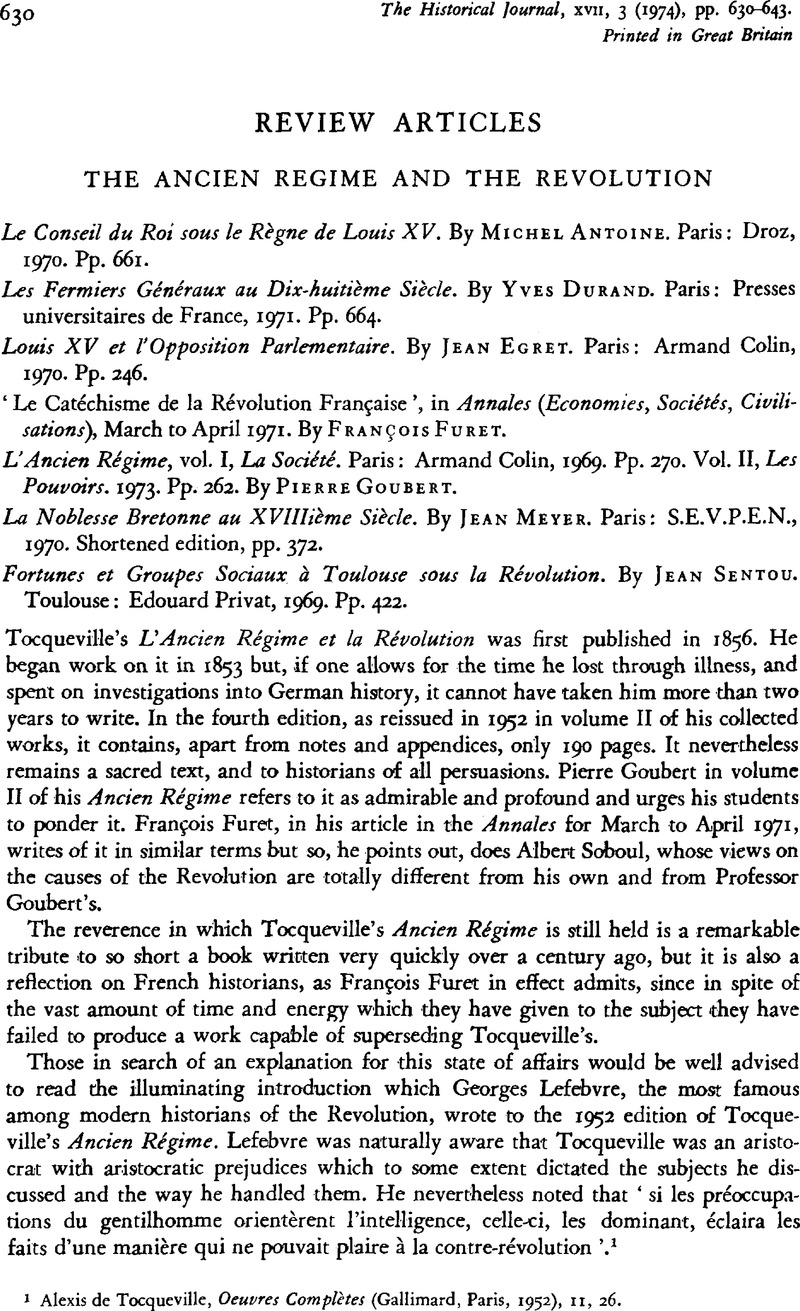No CrossRef data available.
Published online by Cambridge University Press: 11 February 2009

1 de Tocqueville, Alexis, Oeuvres Completes (Gallimard, Paris, 1952), II, 26.Google Scholar
2 Ibid. p. 20.
3 Ibid. p. 19.
4 Ibid. p. 21.
5 Ibid. pp. 71–2.
6 Ibid. p. 145.
7 Ibid. pp. 108–9.
8 Ibid. p. 109.
9 Ibid. pp. 147 and 244.
10 Ibid., Book II, ch. x.
11 Dumont, Etienne, Souvenirs sur Mirabeau (ed. Benetruy, J., Paris, 1951), p. vii.Google Scholar
12 Lefebvre, G., Quatre-Vingt-Neuf (Paris, 1939), p. 6.Google Scholar
13 Op. cit., p. 19.Google Scholar
15 Bésenval, , Mémoires (ed. Ségur, , Paris, 1805), p. 69.Google Scholar
16 Antoine, M., op. cit., pp. 200 and 212.Google Scholar
17 Tocqueville, , op. cit., p. 160: ‘ en France …Elle [l'Taristocratie] a rerenu pour jusqu’ à la fin l'immunite d'impôt pour se consoler d'avoir perdu le gouvernement.’ Admittedly Tocqueville qualified this statement (as, to the confusion of the reader, he qualified or contradicted most of his more famous statements) in other parts of his work. See, e.g., p. 152, where he refers to taxes paid by noblemen, and p. 153, where he refers to the ways of escaping the taille available to the bourgeois.Google Scholar
18 Op cit., pp. 152 and 153.Google Scholar
19 Sentou, Jean, op. cit., pp. 468–9.Google Scholar
20 Furet, F. et Daumard, A., op. cit. (Paris, 1961), Table opposite p. 20.Google Scholar
21 Lefebvre, C., Etudes Orléanaises (Paris, 1962), p. 137.Google Scholar
22 Sentou, Jean, op. cit., p. 472.Google Scholar
23 Taylor, G.V., ‘ Non-Capitalist Wealth and the Origins of the French Revolution ’, American Historical Review, vol. 72, 01. 1967.CrossRefGoogle Scholar
24 Sentou, Jean, op. cit., p. 471.Google Scholar
25 See, for example, the reaction of Friedrich von der Marwitz to Sieyès when he was ambassador to Berlin in 1798. Sieyès corresponds exactly to Jean Sentou's definition of a bourgeois. Marwitz said of him that he was ‘ ein Kerl mit einem wahren Kanaillengesicht, mit scinem schwarzen Kopf (damals ging noch Alles gepudert)… ein schreckendes Omen der Zeit’ (Meusel, ,Friedrich August Ludwig von der Marwitz (Berlin 1908–1913), I, 347).Google Scholar
26 Tocqueville, , op. cit., p. 96.Google Scholar
27 For example, though he sets great store by ProfessorBosher, 's French Finances 1770–1795 (Cambridge, 1970), which he describes as ‘ la première étude séVieuse de l'incroyable non–administration centrale des finances à la fin du XVIIIieme siécle’ (11, 315), he can hardly be said to bring out Professor Bosher's main points. In his description of the king's Council, which appears to be taken from Michel Antoine's work, he makes no mention of the part played by the court nobility and leaves the reader with the impression that the Council was composed entirely of Robins. On p. 210 of vol. 11, speaking of the nobility, he says: ‘ Pauvre, objectivement, elle ne l'est presque jamais, et Jean Meyer a régié le problème.’ He does not say what he means by ‘ objectively ’, though Jean Meyer by implication does. In an article in the Rev. d'hist. mod. et contemp. for April to June 1971 Jean Meyer refers to the nobles who were wholly destitute, though without being able to estimate their numbers. (In his Noblesse Bretonne he showed that there were many in Brittany.) As to the rest of the nobility, it is plain from Jean Meyer's account that a considerable proportion were very poor judged by any standard other than that of destitution.Google Scholar
28 This is not what is always meant. Colin Lucas, for example, in an article in Past & Present (No. 60, Aug. 1973), refers to roturiers as members of the elites, and seems to understand by this term all the people who held any position of authority, however humble; so that, for instance, not only that grand seigneur, M de Lubersac, bishop of Chartres, but also his secretary, Sieyes, who later became a canon, would count equally as members of the elites. This is certainly not the view which Sieycs took of the matter, and to the present writer Mr Lucas' terminology seems misleading, at least when the causes of the Revolution are in question, because it obliterates differences which plainly existed in both material circumstances and attitudes towards the need for change.
29 Antoine, Michel, op. cit., p. 597.Google Scholar
30 See Mousnier, R., La Vénalité des Offices sous Henri IV et Louis XIII (Paris, 1945), p. 469 and passim; J. F. Bosher, French Finances 1770–1795.Google Scholar
31 François Furet makes the further point, which is also made by Jean Meyer, and by Colin Lucas in the article in Past & Present (No. 60, Aug. 1973), that the nobility was too open a group to be cohesive but too narrow to petmit the degree of mobility needed in an increasingly prosperous country. All these writers see in this state of affairs a major cause of social discontent. It is certainly true that the nobility was not a united body and that if was divided primarily by great differences of wealth. These differences, however, seem attributable as much to the inability of the State to get rid of the poor nobles as to its willingness to ennoble rich bourgeois. The poor nobles were a nuisance to many governments besides rhe French. Stein, for example, launched many diatribes against them. They were, however, an inevitable consequence of the société d'ordres and provide merely another illustration of the hostility, already discussed, which developed in the eighteenth century to this form of society. As to the exasperation created in some sections of the bourgeoisie because the avenues to power seemed too narrow, this is a point which has also already been discussed here in connexion with Jean Sentou's analysis of the class struggle.
32 Bosher, J F., op. cit., p. xi.Google Scholar
33 Necker, J., ‘ De PAdministration des Finances’, in Oeuvres Complètes (ed. de Staël, Baron, Paris, 1821), iv, 7.Google Scholar